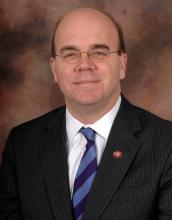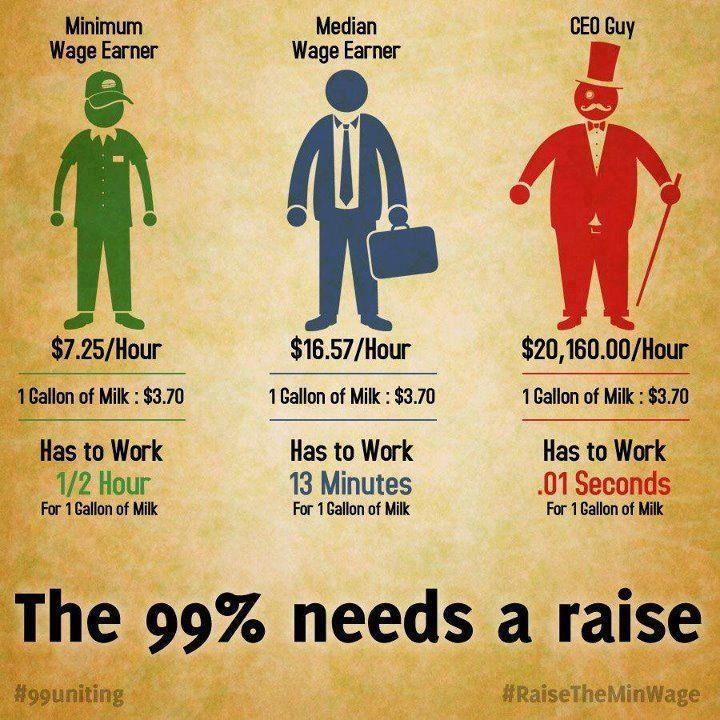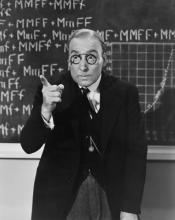Did you know that there are more than 10 million Americans involved in worker-owned companies? Take a look.
Economic Justice

Big money has corrupted our politics, and We the People want it fixed.

A common rationalization those in religious circles make for cutting social programs that help the poor is that church should be the one helping “the least of these,” not the government. But if we know that’s not possible given the church’s means, that millions will get left behind because our efforts fall far too short, is that still a logical line of defense? Jesus told us to care for the poor, sick, and vulnerable—he didn’t prescribe how.
Sometimes Jesus healed people one-on-one. Sometimes he addressed the needs of a multitude by providing enough food to feed them all. Sometimes he sent others in his stead to provide healing.
If we ignore the needy in our midst by getting rid of one huge way to address that need, we are not following Jesus’ example.

Editor's Note: On Wednesday, the House Agriculture Committee voted to slash $16.5 billion in nutrition assistance funding in the farm bill. Rep. James McGovern led efforts to stop the drastic cuts to anti-hunger programs. He offers his thoughts to Sojourners on the committee decision.
I am disappointed that a majority of the House Agriculture Committee voted against my amendment to eliminate the $16.5 billion in cuts to the Supplemental Nutrition Assistance Program, or SNAP, included in the Farm Bill. These cuts are detrimental, cruel, and immoral. They literally take food away from hungry people; people who are poor; people who struggle to feed their families. SNAP is the most effective and efficient federal program. Let me repeat that – the most effective and efficient program. In fact, the error rate was 3.81 % in 2010, the lowest in the history of the program. And that rate continues to decrease.
It is false to say that these cuts won’t affect benefits or that they are merely closing loopholes. They will result in less food for hungry, low-income Americans – period.

In the name of protecting the “middle class” some politicians have been pressing for extensions of the Bush Tax Cuts for all earnings up to $1 million. They are calling folks in the top 1 percent “middle class.” This week, President Obama announced that he would extend the Bush era tax cuts for all earnings up to $250,000, but not beyond this threshold. Still hard to swallow the idea of those being “middle class” tax breaks but it’s an improvement from calling millionaires “middle class.”
While Jesus loves everybody, there is no Christian tradition of teaching God’s “preferential option for the middle class.” For Christians, it’s still about the poorest and most vulnerable, and here is why these tax issues matter to those Jesus called “the least of these.”
Politicians, pundits, concerned citizens alike are all looking for the magic bullet to generate revenue without alienating an entire voting bloc or causing the American people more angst. Celebrities, pastors, and community leaders think the Robin Hood tax—taxing less than half of 1 pecent on Wall Street transactions— is the answer.
What say you?
Mother Jones on the last taboo - population:
"The United Nations projects that world population will stabilize at 9.1 billion in 2050. This prediction assumes a decline from the current average global fertility rate of 2.56 children per woman to 2.02 children per woman in the years between 2045 and 2050. But should mothers average half a child more in 2045, the world population will peak at 10.5 billion five years later. Half a child less, and it stabilizes at 8 billion. The difference in those projections—2.5 billion—is the total number of people alive on earth in 1950.
NPR report on the plight of the poorest in Reading, Pa. - the poorest city in the United States:
"Like many mothers in Reading, Boggs has no husband to share the bills. Poverty is high, but it's a lot higher for single mothers. An astounding 66 percent of them in Reading live below the poverty line, less than $19,000 for a family of three. Boggs admits that she made some bad decisions in life and that her daughters' two fathers turned out to be unreliable. But, she quickly adds, "I wouldn't change anything in the world for my kids, my daughters. They're what keeps me going and keeps me fighting to keep searching, as bad as the economy is. If it was just me, I would have [given] up a long time ago." You hear that a lot around the learning center: hope that things will get better if you just keep plugging away, despite the bad times."
Learn more here

Anti-poverty advocates and members of Congress are speaking out against proposed cuts to anti-hunger programs being considered in the broader political tussle over the Farm Bill. Over ten congressional representatives, including Rep. Jim Clyburn (D-SC) and Rep. Rosa DeLauro (D-CT), joined a rally denouncing.
From The Nation:
"One might expect that the workplace would have adapted to accommodate these changes. With nearly double the number of available workers, and the fact that all employees now likely need to pitch in to share domestic duties, we might hope that employers would lower workers’ expected output. Yet exactly the opposite has happened."
Read the full article here
Writing for The Atlantic, Derek Thompson takes a look at what the President's tax plan actually does:
"In the long run, historically low tax rates for the "bottom" 98 percent aren't sustainable. For President Obama, demanding higher taxes on rich people is the easy part. Three in five people told Gallup that "upper-income people" were paying too little in federal taxes, Molly Ball reported. The hard part is facing up to the long-term reality that historically low tax rates on 98 percent of Americans is no way to pay for historically high entitlements for 100 percent of Americans."
Learn more here

Last week was the first time I have ever been called a “poverty pimp” in front God and everyone—in public. It certainly got my attention!
As Director of International Child Care Ministries, I straddle two worlds—the America I call home and the 30 countries where our sponsored children live. I travel back and forth between these two worlds several times a year and experience the stark contrast between my world and theirs.
Here in the U.S., part of my responsibility is to advocate for the children at conferences, churches, and other venues. Last week at an event I had my display set up, 20 kids’ faces looking out from their brochures, silently imploring conference attendees to choose them and become their sponsors.
My accuser was an eloquent professor of African American Studies. He is offended at groups like mine who apparently profit off Africa’s poverty and perpetuate an image of Black helplessness. He is concerned that African American children who view pathetic images of hungry kids on TV internalize a sense of racial inferiority. And that’s not the half of it.
You probably have a gallon of milk in your fridge. It might be fat free, soy, or maybe even 1 percent. Most of us drink milk in some form. But how long does it take for us to  earn enough to buy it?
earn enough to buy it?
As part of their ‘Raise The Minimum Wage’ campaign, 99 Uniting produced this telling infographic, comparing how long it takes a minimum wage earner, a median wage earner and ‘CEO Guy’ to earn a gallon of milk. It makes for some sad and frustrating reading …
A New York Times op-ed this week examined the growing phenomenon of poverty in the suburbs:
"Hardship has built a stronghold in the American suburbs. Whatever image they had as places of affluence and stability was badly shaken last year, when reports analyzing the 2010 census made it clear that the suburbs were getting poorer.
While the overall suburban population grew slightly during the previous decade, the number of people living below the poverty line in the suburbs grew by 66 percent, compared with 47 percent in cities. The trend quickened when the Great Recession hit, as home foreclosures and unemployment surged. In 2010, 18.9 million suburban Americans were living below the poverty line, up from 11.3 million in 2000."
Learn more here
Writing for The Huffington Post last Friday, Richard C. Leone asks:
"So is a renewal of the war against poverty in the offing? The current balance of political forces suggests that, rather than muster all the weapons we have to fight for the poor, many are willing to settle for uneasy neutrality. This is one "war of choice" we choose not to wage. Austerity is the watchword of the day defined somewhat differently but accepted by the mainstream of both parties as the bedrock of policy for the foreseeable future…
It's past time to connect the dots and see that by ignoring the poor we undermine the welfare of everyone in the 99 percent living from pay check to pay check. We must revive our generous national nature. And more selfishly come to see that we might find ourselves in their shoes. It may be that the poor will always be with us, but that doesn't mean it's OK to ignore them."
Read more here

“So what brings you in to the clinic tonight?” I ask, beginning a conversation with a middle-aged woman in typical fashion.
“I need some help with my medication,” she tells me, digging into her purse for the packaging from her last filled prescription.
“It’s for high blood pressure, but… I can’t afford it anymore.”
I take a look at her chart.
“Oh!” I say, pleased with my growing ability to recognize medications without aid from a reference text. “I think that’s on the Wal-Mart list. We should be able to give you a prescription for the generic which will be just four dollars per month at Wal-Mart.”
“I know,” she says. “That’s what I was prescribed. I can’t afford it.”
I don’t talk much about the Affordable Care Act in day-to-day conversation, even with the Supreme Court’s decision last week to uphold its constitutionality. In fact, I try to avoid it. It’s just not a conversation I’m poised to treat as small talk, simply because it’s a conversation that goes way deeper than I think most people realize.
[view:media=block_1]
After Walmart closed up shop in McAllen, they left 124,500 square feet of retail space behind for use by the city.
Rather than bring in another big box corporation to pick up where Walmart left off, the southern Texas city decided to turn the building into its new public library. And not just any public library neither: Upon its completion, the McAllen Public Library became the largest single-story library in the United States.
The project was massively successful: Registration by first-time patrons went up by 23% in the library's first month of operation, and its "functional, flexible and affordable" interior — constructed by Minneapolis-based Meyer, Scherer & Rockcastle, Ltd. — was recently named winner of the International Interior Design Association's 2012 Library Interior Design Competition.
Read the full report HERE.

MILFORD, Mass. — A Massachusetts man who pledged to make the last mortgage payment on his home with pennies has fulfilled that promise.
After warning his bank, Thomas Daigle dropped off about 62,000 pennies weighing 800 pounds in two boxes for the final payment on the Milford home he and his wife, Sandra, bought in 1977.
He started saving his pennies when he moved in.
Read the full story HERE.

Marcel Pohl, a student at The School of Economics and Management in Essen, Germany, says he couldn't believe it when he found out the university was suing him for graduating with a master's degree after just three semesters.
"When I got the lawsuit, I thought it couldn't be true," the 22-year-old told Bild. "Performance is supposed to be worth something."
Economists
The Daily Show correspondents weigh in on why economists are more than just nerdy, high-panted economic yodas with no accountability. More inside the blog.